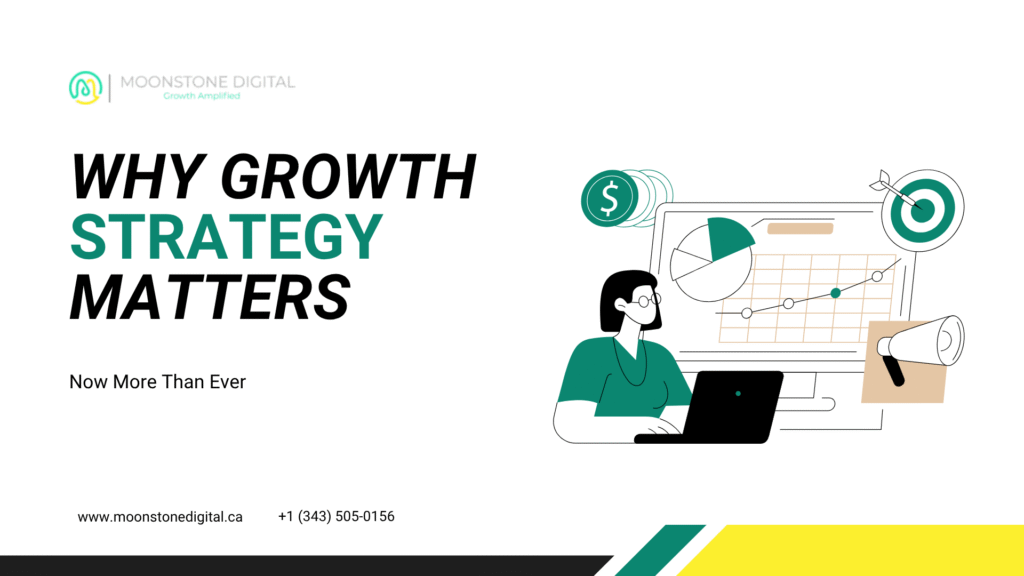
Every business wants growth, but very few have a clear, structured strategy for achieving it. In a world of evolving markets, shrinking attention spans, and increasing competition, hoping for growth isn’t a plan; strategic planning is.
This guide breaks down everything you need to know about growth strategy for businesses, from what it is to how to build one that’s data-driven, sustainable, and aligned with your company’s stage and vision.
Whether you’re a startup founder, an SME owner, or a corporate strategist, this guide offers you frameworks, tools, and real-world case studies to build and execute a strategic roadmap for scalable business growth.
What Is a Growth Strategy?
A growth strategy is a long-term plan designed to expand a company’s market share, customer base, and revenue. It goes beyond marketing or sales; it aligns product, operations, customer experience, and market positioning to drive sustainable scaling.
Growth strategies typically focus on:
- Entering new markets
- Launching new products or services
- Improving customer acquisition and retention
- Diversifying revenue streams
- Increasing operational efficiency
According to McKinsey, companies that adopt structured growth strategies are 3X more likely to outperform peers in revenue over five years.
Why Businesses Need a Growth Strategy
1. Clarity and Focus
A growth strategy sets clear objectives and prioritizes efforts, helping businesses avoid shiny-object distractions and focus on what drives impact.
2. Risk Mitigation
Scaling without a strategy often leads to operational chaos or market misalignment. Strategic planning reduces uncertainty by basing growth moves on data and insights.
3. Investor & Stakeholder Confidence
A documented growth strategy signals maturity to investors, partners, and teams—boosting credibility and helping secure funding or buy-in.
4. Sustainable Scaling
Growth isn’t just about speed; it’s about scaling smart. A strategy ensures that growth doesn’t come at the expense of quality, culture, or profitability.
Key Components of a Business Growth Strategy
Here’s what must be in every growth strategy, regardless of industry or size:
1. Market Analysis
- Who are your customers?
- What are the emerging trends?
- What are competitors doing?
Use SWOT analysis, customer personas, and competitor benchmarking to shape your approach.
2. Product or Service Development
Innovation is key. This may include:
- Iterating current products
- Creating new offerings
- Adding features based on customer feedback
3. Customer Acquisition and Retention
Growth is a leaky bucket if you focus only on acquiring customers but not retaining them.
- Use performance marketing, SEO, and partnerships for acquisition
- Use loyalty programs, email nurturing, and exceptional service for retention
4. Revenue Diversification
Don’t rely on a single revenue stream. Explore:
- New product lines
- Subscription models
- Geographic expansion
- Strategic partnerships
5. Competitive Positioning
What’s your edge? Define your unique value proposition (UVP) clearly.
- Compete on price, quality, speed, experience, or a unique blend.
Business Growth Frameworks & Models
Ansoff Matrix
A 2×2 matrix showing four growth strategies:
- Market Penetration
- Product Development
- Market Development
- Diversification
Use this to evaluate risk levels and strategic options.
Blue Ocean Strategy
Focuses on creating new demand in untapped markets rather than competing in saturated ones.
Ideal for businesses ready to leap beyond incremental gains and differentiate drastically.
Porter’s Generic Strategies
Outlines three ways to compete:
- Cost Leadership
- Differentiation
- Focus (niche strategies)
Useful for aligning your growth strategy with long-term competitive advantage.
Growth Strategies for Different Business Stages
Startups (0–3 years)
- Focus on product-market fit
- Use MVPs and lean testing
- Rapid acquisition through digital channels
- Establish foundational brand presence
SMEs (3–10 years)
- Systematize operations and marketing
- Diversify customer acquisition channels
- Begin expansion into new markets or segments
- Focus on retention and customer lifetime value
Established Enterprises
- Explore mergers/acquisitions
- Optimize cross-department alignment
- Expand globally
- Innovate through R&D or spin-off products
Tools and Technology for Growth Planning
Tech stack matters. Here are the tools growth-driven businesses rely on:
- Analytics Platforms
- Google Analytics 4 (GA4)
- Mixpanel
- Hotjar
Track behaviour, conversion paths, and campaign ROI.
2. CRM & Marketing Tools
- HubSpot, Salesforce, ActiveCampaign: Manage leads, automate nurturing, and streamline sales workflows.
3. Project Management Tools
- Asana, Trello, ClickUp: Align team execution with strategic priorities.
4. Financial Planning Tools
- QuickBooks, Xero, LivePlan: Forecast revenue growth and cash flow accurately.
Case Studies of Successful Growth Strategies
1. Glossier (Direct-to-Consumer)
Used customer-generated content and feedback to drive product development and virality.
2. Starbucks (International Strategy)
Used geographic expansion + loyalty tech + product innovation to fuel global growth.
Your Growth Journey Starts Here
Business growth doesn’t happen by luck; it happens by strategy. A strong growth strategy doesn’t just help you scale; it ensures you scale the right way, with clarity, alignment, and momentum.
- Start with analysis.
- Define your positioning.
- Choose a growth framework.
- Execute with the right tools.
- Learn and iterate fast.
At Moonstone Digital, we specialize in creating data-backed growth strategies tailored to your business goals. Whether you need help with Google Ads, retention campaigns, or CRM automation, we’ll help you plan, execute, and scale profitably.
Call us at +1 (343) 505-0156. Visit our services page to book a free consultation.
